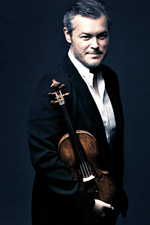> [Archived] Interviews

An Interview with the Violinist Vadim Repin
Mr.
Vadim Repin, it was a privilege to have you as our guest at the
‘George Enescu’ International Festival in the autumn of 2013. You
then interpreted a work which is dear to you, Prokofiev’s Concerto
No. 2 for Violin and Orchestra.
What came after Bucharest in your agenda? Where did your violin take
you?
A bit on each continent, Japan, then Europe, a special moment was the interpretation of Alan Berg’s Violin Concerto in Indiana; a great orchestra and an amazing conductor, my friend Kent Nagano, who will be opening the first edition of my festival in Novosibirsk. This concert was a great delight to me. I have to mention that I also had the chance to return home, in Paris or Milan, to see my wife, Svetlana Zakharova, in a few performances. I was very busy and satisfied. I had some good and interesting concerts.
Your
next concert will be in Moscow, then, Sankt Petersburg and, after the
New Year, Essen, Paris, Hong Kong, Beijing, Lyon, Grenoble and, at
the end of February, in Great Britain. You’ll interpret opuses that
you love, but in terms of repertory, you’ll alternate romantic
opuses with those belonging to the 20th
century.
When choosing the repertory I’ll interpret, what matters is not the period when the work was composed or the style, but whether I enjoy playing that opus here and now. My favourite works are Brahms’ Concerto and Prokofiev’s Concerto No. 2. However, the crucial factor when I choose a programme is represented by the contents and the emotional charge of each opus. Whenever I’m on stage, I feel as if I were leading a different life. A lot of composers have dedicated works to me over the past few years. The best example is the composer James McMillen, whose opus is original, fresh, but also has an incredible emotional charge, which makes me happy to play it on stage and relive each mood with every interpretation.
When
you have a new score on your rack or you are offered a work for a
first audition, what are the aspects you look into?
I believe that the architecture of the music is very important. In classicism, the rules are very strict and they can generate the emotional complexity. When I read a new score or I return to an older one (because I think that every opus should be left to ‘rest’ for a while), I am very careful about the information that the composer wrote down on the score. I think that every interpreter should discover the logic of the discourse, before even playing the first note. I believe that we have to be as exact and loyal to the composer’s ideas as possible. Then, everyone has their own personality, their own manner of understanding expressivity. But this fidelity to the composer’s discourse is, I think, the number one priority.
Mr.
Repin, your approach towards music is classical, but have you never
been tempted to approach the crossover style or parody?
This is very interesting, especially if I think about my future festival: in one of the concerts my partners will be Didier Lockwood, a famous jazzman and Aleksey Igudesman, the prototype of the virtuoso. And there will also be an evening with entertainment music. We’ll try to cross borders. The violin will be the protagonist. Besides the dialogue that we’ll create on stage, there will be some interesting sessions of improvisation. I remember that in the past I was invited to gala concerts: for example, in Warsaw, to a film festival, where the organizers turned the violin into the evening’s hero. Incredible people joined me then: artists like Regina Carter or Jean DuPonty and together we had the chance to create a dialogue, an improvisation based on the music we had in mind at that moment. I believe this is important and represents a challenge for both the artists and the audience. But I consider myself a classical violinist and the interpretation of an opus from the past is the first priority.
But
sometimes you still like to smile together with your friends?
Certainly, because that smile prolongs our life.
Mr.
Vadim Repin, to conclude our interview: do you have a dream for 2014,
besides the projects already on the way?
My personal dream, and I think it’s everyone’s dream, is for my family to be healthy and for us to always be happy together. I wish to have as many magical moments as possible, such as Christmas, because the purpose of Christmas is for everyone to be reunited and to spend these special moments in the same space, at the same table and to feel the communion, a normal feeling, but in my opinion, a very important one.
Translated by Mihaela Olinescu and Elena Daniela Radu
MTTLC, The University of Bucharest














